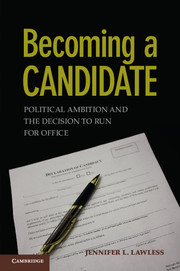Book contents
- Frontmatter
- Contents
- List of Tables
- List of Figures
- Acknowledgments
- 1 Mudslinging, Money-Grubbing, and Mayhem
- 2 The Decision to Run for Office
- 3 Political Ambition in the Candidate Eligibility Pool
- 4 Barack Obama and 18 Million Cracks in the Glass Ceiling
- 5 You Could Be President Someday!
- 6 On-the-Job Training
- 7 You Think I Should Run for Office?
- 8 Biting the Bullet
- 9 Future Patterns of Candidate Emergence and Studies of Political Ambition
- Appendix A The Citizen Political Ambition Panel Study
- Appendix B The First Wave Survey (2001)
- Appendix C The Second Wave Survey (2008)
- Appendix D The First Wave Interview Questionnaire
- Appendix E The Second Wave Interview Questionnaire
- Appendix F Coding of Variables
- Works Cited
- Index
- References
2 - The Decision to Run for Office
The Theoretical and Methodological Approach
Published online by Cambridge University Press: 05 June 2012
- Frontmatter
- Contents
- List of Tables
- List of Figures
- Acknowledgments
- 1 Mudslinging, Money-Grubbing, and Mayhem
- 2 The Decision to Run for Office
- 3 Political Ambition in the Candidate Eligibility Pool
- 4 Barack Obama and 18 Million Cracks in the Glass Ceiling
- 5 You Could Be President Someday!
- 6 On-the-Job Training
- 7 You Think I Should Run for Office?
- 8 Biting the Bullet
- 9 Future Patterns of Candidate Emergence and Studies of Political Ambition
- Appendix A The Citizen Political Ambition Panel Study
- Appendix B The First Wave Survey (2001)
- Appendix C The Second Wave Survey (2008)
- Appendix D The First Wave Interview Questionnaire
- Appendix E The Second Wave Interview Questionnaire
- Appendix F Coding of Variables
- Works Cited
- Index
- References
Summary
In June 2008, fitness expert Richard Simmons testified before the House Education and Labor Committee about the ills of childhood obesity. In a passionate plea to the committee, Simmons asked the members to consider their shared responsibility for the epidemic and urged lawmakers to redouble their efforts to improve public schools’ physical education and school exercise programs: “Our children today will not live as long as their parents. What have we done? What have we done to the kids of the United States of America? This is wrong! And I will dedicate the rest of my life [to this]!” Then, to the committee's and the media's surprise, Simmons blurted out that dedicating the rest of his life to the issue might involve entering the electoral arena: “Chairperson George Miller, I just may run for office to help this really get through and not have one kid feel lousy about himself because he can't throw a ball!” Simmons, who had never before indicated any interest in running for office, followed up the hearings with a series of interviews in which he explained that if he concluded that seeking an elective position would be the most effective way to promote change, then that was the path he would take.
Whereas Richard Simmons's articulation of his potential interest in running for office caught many people off guard, now-U.S. Senator Sheldon Whitehouse (D–RI) surprised no one when he announced that he was considering challenging incumbent U.S. Senator Lincoln Chafee in 2006. In a comment he later described as “idiotic” and “stupid,” Whitehouse mused to a political reporter that he was “trained and basically bred” to run for office. Indeed, the son of a diplomat (his father served as ambassador to Laos and Thailand) and a graduate of Yale University and the University of Virginia Law School, Whitehouse had been a fixture in Rhode Island politics for decades. He served first as an assistant attorney general, then as a U.S. attorney, and then won election as attorney general in 1998. Asked to characterize his interest in the 2006 Senate race, Whitehouse explained, “If you talk to somebody who is a musician and if they can't do it, life is not complete. This applies to anybody who cares deeply about doing something, whether it is driving NASCAR or performing surgery or caring for people in the ministry or tending bar.” Not necessarily motivated by any one particular issue or policy, Sheldon Whitehouse had simply always had a passion for public service and an interest in running for office.
- Type
- Chapter
- Information
- Becoming a CandidatePolitical Ambition and the Decision to Run for Office, pp. 14 - 30Publisher: Cambridge University PressPrint publication year: 2011



